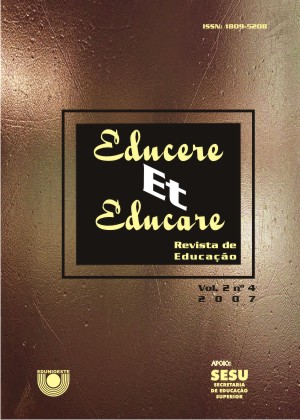THE PEDAGOGICAL COORDINATOR IN BASIC EDUCATION: CHALLENGES AND PERSPECTIVES
DOI:
https://doi.org/10.17648/educare.v2i4.1656Keywords:
escola, educação, formação de professores, coordenador pedagógicoAbstract
This work discusses the pedagogic coordinator’s role in teachers’continuing education development in schools. The importance of this study in the university, as well as in the center of basic education in schools, a place of the exercise of this professional’s leadership, certainly they are shown to be punctual in the organization and unfolding of the coordinator’s attributions in relation to their role, in relation to their theoretical-methodological commitment, to the establishment of a climate favorable to the development of a pedagogic work that respects the different voices that arise in the school environment. Through a literature review, discussions and analysis of experiences in the daily life of the school, we selected some aspects that kept repeating for discussion. We noticed that the pedagogic practice is constructed by all the social actors’ contribution, whose facilitative subject, can be realized, among others, in the pedagogic coordinator’s role.
Downloads
Published
01-01-2000
How to Cite
LIMA, P. G.; DOS SANTOS, S. M. THE PEDAGOGICAL COORDINATOR IN BASIC EDUCATION: CHALLENGES AND PERSPECTIVES. Educere et Educare, [S. l.], v. 2, n. 4, p. p. 77–90, 2000. DOI: 10.17648/educare.v2i4.1656. Disponível em: https://e-revista.unioeste.br/index.php/educereeteducare/article/view/1656. Acesso em: 5 dec. 2025.
Issue
Section
Núcleo Temático: Aprendizagem e Ação Docente
License
Aviso de Direito Autoral Creative Commons
Política para Periódicos de Acesso Livre
Autores que publicam nesta revista concordam com os seguintes termos:
1. Autores mantém os direitos autorais e concedem à revista o direito de primeira publicação, com o trabalho simultaneamente licenciado sob a Licença Creative Commons Attribution que permite o compartilhamento do trabalho com reconhecimento da autoria e publicação inicial nesta revista.2. Autores têm autorização para assumir contratos adicionais separadamente, para distribuição não-exclusiva da versão do trabalho publicada nesta revista (ex.: publicar em repositório institucional ou como capítulo de livro), com reconhecimento de autoria e publicação inicial nesta revista.
3. Autores têm permissão e são estimulados a publicar e distribuir seu trabalho online (ex.: em repositórios institucionais ou na sua página pessoal) a qualquer ponto antes ou durante o processo editorial, já que isso pode gerar alterações produtivas, bem como aumentar o impacto e a citação do trabalho publicado (Veja O Efeito do Acesso Livre).
Licença Creative Commons
Esta obra está licenciada com uma Licença Creative Commons Atribuição-NãoComercial-CompartilhaIgual 4.0 Internacional, o que permite compartilhar, copiar, distribuir, exibir, reproduzir, a totalidade ou partes desde que não tenha objetivo comercial e sejam citados os autores e a fonte.


